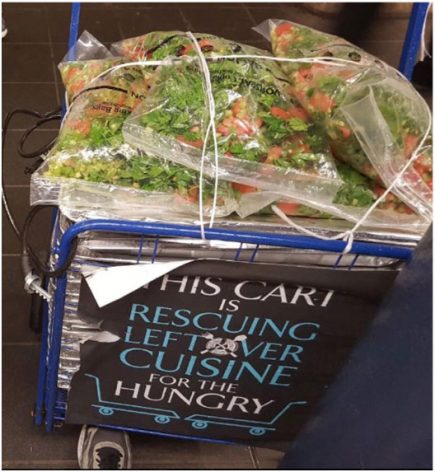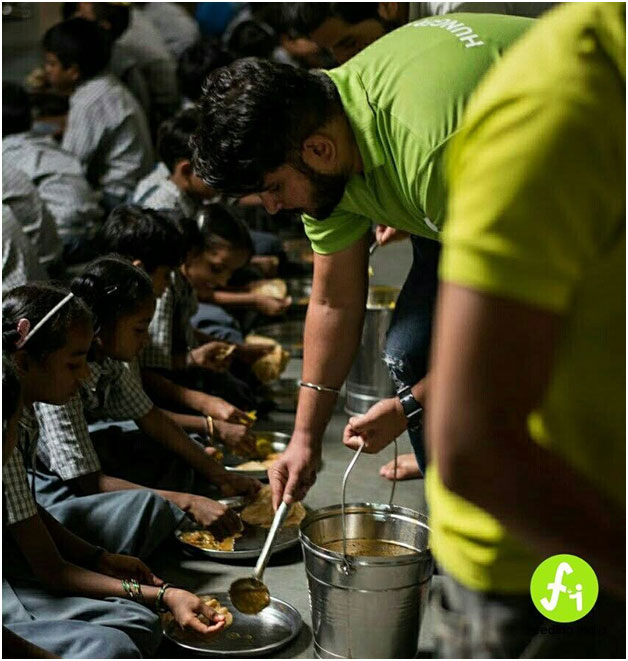Bridging the Gap between Hunger & Food Waste During a Pandemic

NEW DELHI, Apr 14 (IPS) - On March 12, the first email came in. An email from a boutique hotel that said they needed to postpone their apron order. The hotel had decided to put a hold on all non-essential spending until everything was, according to them, back to normal.
This email was followed by a similar email, and then another. Within a few days, all our wholesale orders were either postponed or canceled.
At the time, I realized I needed to be extremely resilient as Covid-19 was going to take a hard hit on my business. As the virus took over the news and seemed to be impacting everyone on the planet, I realized a lot more was at stake.
I started ‘Cooks Who Feed' because I wanted to bridge the gap between hunger and food waste. Not only was the virus impacting my ability to combat this problem, but it was making the problem worse on a global scale.
Hunger is not a new problem and definitely not one relegated to developing countries. In fact, most countries have some level of food insecurity. According to the World Food Programme (WFP), over 800 million people, that's one in nine, go to bed hungry. On top of that, one in three suffer from some form of malnutrition.
The irony here is that in a world with so much hunger, so much food is wasted. The WFP states that hunger is not about a lack of food. Right now, the world produces enough food to nourish every man, woman, and child on the planet. However, about $1 trillion of food is lost or wasted each year.
This amount is roughly one-third of all food produced worldwide. According to the U.N. Food and Agriculture Organization, reversing this trend would save enough food to feed 2 billion people .
I started my company to address this hunger and food waste paradox. At Cooks Who Feed, our mission is to empower food lovers to take action for a hunger-free world. Our company produces beautifully designed handcrafted aprons.
When someone buys an apron, food waste is rescued and used to provide 100 nutritious meals. To fulfill our 1 apron = 100 meals promise, we share the profits from every apron sold with our charity partners who rescue fresh, surplus food and distribute it to those in need of a meal.

We currently have a charity partner in Canada, the USA, and India. To increase our impact, we sell our apron via our website and create co-branded aprons for businesses focusing on sustainability.
So, what prompted me to start Cooks Who Feed? It was my passion for food.
I love to cook and believe that sharing a good meal not only feeds our body; it feeds our soul. Many of my fondest memories revolve around sharing a meal. But, as much as food gives me joy, I've always been bothered by the number of people who go hungry and do not get to experience food the way I do.
I struggle to live in a world of feast or famine. Why do so many go hungry when so much food is thrown out?
It was this question that led me to learn about nonprofit organizations that focused on redirecting food destined for the landfill. This is when I started connecting the dots and the idea for Cooks Who Feed was born.
The backbone of the company is our production team in India. All our aprons are handmade by a group of marginalized women. The ladies are provided with safe and fair work with the goal of getting them out of poverty.
Prior to March 12, if you would have asked me about my business, I would have told you that it was positioned for growth and things were going well. The virus changed that. Businesses that purchased my aprons were predominantly in the hospitality industry, an industry that was drastically impacted by the virus.
With many of these businesses reducing their operations or closing their doors during the pandemic, it's no surprise that my business was hurt as well.
Although my business, and many others, are facing challenging times, the very issue I set out to address is being magnified at so many levels. Take food waste for example. Although there are many charities whose mission is to rescue food waste, these organizations rely heavily on donations.
Many charities are saying they fear collapse as COVID-19 wreaks economic havoc on their donors. Much like private sector businesses, charities have also had to lay off employees as grant programs are canceled and donations dwindle. To add to this, much of the work carried out by charities is done by volunteers. With social distancing in place and many worried about their health, finding volunteers has been very difficult.
Aside from these charities, the pandemic has shaken the food supply chain. As the hospitality sector shuts down and panic over the virus causes many to hoard food, food supply chains that rely on stability have been disrupted. This has led to a surge in food waste.
Unfortunately, hunger has also been negatively affected by the virus. In the western world, many families rely on school meals and meals donated by charities. The number of people dependent on such donations has also increased with the pandemic as many have lost their jobs. In developing countries, the toll on hunger is much greater. Look at India for example.
Migrants workers from rural areas who rely on their daily wages have now lost their jobs in the big cities. With the country on lockdown, unable to return to their village, these workers are now homeless and hungry.
Although humbled by the realization that many people are and will continue to suffer much more than I can ever imagine, I find myself even more compassionate as problems I care so deeply about become heightened. So I do what every true entrepreneur does….hang tight and focus on what one can control. This too shall pass - I know it will - and when it does, I'll be ready.
© Inter Press Service (2020) — All Rights ReservedOriginal source: Inter Press Service
 Global Issues
Global Issues